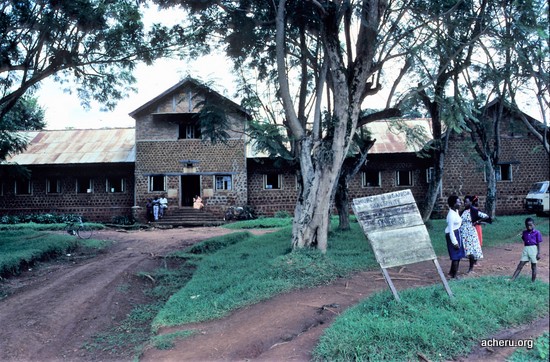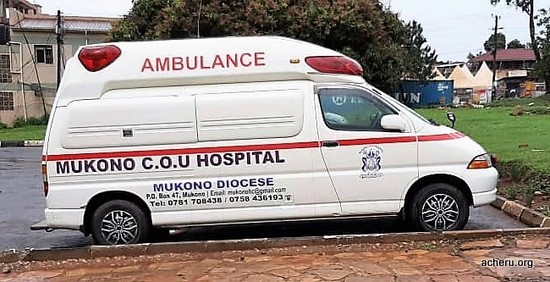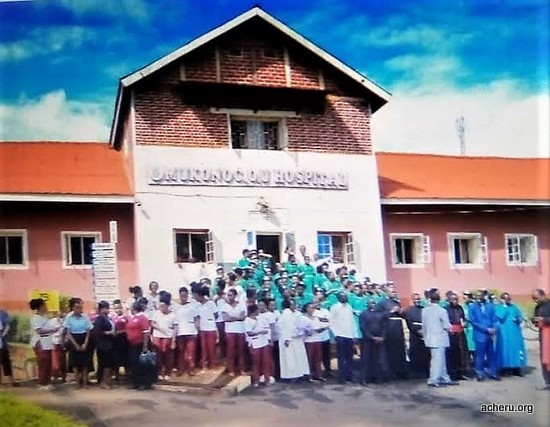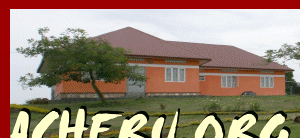|
|
| August 2020 report: The impact of Covid 19 on our work, and some background to medical missionary work in Uganda |
| The coronavirus continues to cast a long shadow, and we need to consider how it might affect our work in the future. We're having to deal with this here, and in Uganda. I'm fortunate in having been able to work from home, or go alone to the office and store, but there are increasing problems in not being able to get help with some things. I am grateful to those individuals who have given whatever help they could, enabling us to maintain our support for the work in Uganda. |
| I think this may be an appropriate time to reassure all our donors about our financial management. Work continues here on a voluntary basis, and there will be no changes to that. In Uganda, it is not necessary for me to ask them to seek economies as I know they always do their utmost to control expenditure and get maximum cost effectiveness. What we will do is continue, as we have done for some time, to look at all aspects of the work and consider alternatives should changes become necessary so that we are ready to deal with problems rather than face emergencies. |
| One difficulty we now face relates to our surgical programme. From the outset, we've had a deed of partnership with our referral hospital. They had the same arrangement with a number of other organisations. They have a big Christian hospital, and depended on people like Acheru to bring them children. We in turn depended on them for surgery. Some years ago they started to apply charges. We weren't happy about this, but paid them in the interests of the children. When any individual or organisation brought a child to us, we accepted them as an Acheru patient and accepted full responsibility for all costs apart from a small parental contribution from those who could afford it. When we referred a child to CoRSU for surgery our expectation was that they would accept responsibility for them as a CoRSU patient. |
| The deed of partnership is renewed every year, but now they will only provide free surgery for children under five years old. This was sudden and unexpected. Based on last year's figures our increased cost over the next year if we have to pay for operations on over fives would be 40,000 pounds. This is not only unsustainable, it would be completely disproportionate in the context of overall Acheru spending and the numbers we can treat for other conditions. We were already considering a greater emphasis on outpatient and community work, particularly bearing in mind that so many of the conditions we see should have been preventable, so a more widespread and effective programme of community work and education should result in less need for surgery, but this will take time. At present, Acheru has 37 beds for surgical inpatients, and until the disruption resulting from covid, these would usually be filled. Discussion continues about this, and Joyce has been meeting with CoRSU. They've been doing outstanding work, and it will be a tragedy if only the rich can go there for treatment. |
| Basis for Acheru's witness |
| I have been asked by several people whether Acheru continues to maintain a Christian witness. Please be assured that this was the basis for starting the work and that has not changed. We believe that the most effective way to promote our witness in the communities we work among is through a visible manifestation of Christ's love rather than just bringing words to suffering people. The size of Acheru now means it is no longer realistic to have the same family atmosphere as in the early days, but every effort is made to preserve a Christian ethos there and visitors to Acheru are in no doubt about the effectiveness of this. |
| Sensitivity is needed too. Children come to us from a range of backgrounds, but all are made to feel welcome there and I am impressed how readily they come to participate in the programmes undertaken at Acheru. I always remember the words of a visiting American professor who said Acheru was the nearest he had seen to a visible expression of Christ's love on earth. |
| I have to remember too that the effectiveness of the ministry there depends on the quality of the care and treatment and I try to ensure that high standards are maintained. There's a long history of missionary work in Uganda and I believe this was instrumental in transforming the country and establishing not just an effective church but also their medical and education systems. I enjoy reading accounts of the early work there and some of the remarkable people involved. There's a clear link to what we are doing now. |
| The nearest hospital to Acheru, which we have a close relationship with, is in Mukono. It is now a busy district hospital, but it was first established as a maternity unit by Lady Katherine Cook, wife of Sir Albert Cook who founded Mengo Hospital. Her work was particularly noteworthy in an era when the missionaries' wives stayed in the background. |
| The population of Uganda was in decline, and Lady Cook's efforts were directed at reversing the high rate of infant mortality through training programmes for nurses and midwives. The following extract from a 1921 report by Sir Albert Cook helps illustrate the scale of the problem. |
| "The need for this campaign in Bunyoro was very great, for no other country in the Protectorate Blue Book showed such a bad record. In the previous seven years together, the births totalled 15,791, while the total deaths and still-births for the same period numbered 30,699! And to think that three-quarters of this great loss was preventable! An analysis of five hundred patients that we saw showed that over eighty percent, by their own admission, had had syphilis, and when I mentioned this fact to the Mukama, he replied: 'Sir, you may be quite sure that the others have had it too.'" |
| The following account is from the Uganda Herald, Feb 13th 1931: 'Another page in the immortal history of the work of the Church Missionary Society in Africa was turned last Tuesday, when Her Royal Highness, Princess Alice, opened the Lady Stanley Women's Hospital and Maternity Centre at Mukono. It symbolizes the dream of one of Uganda's pioneer missionaries, Mrs A. R. Cook, and it is principally through her untiring devotion, skill, and zeal, that conditions for maternity in Uganda are second to none throughout the length and breadth of Africa. |
| 'Preparations for the foundations were begun three years ago, and the foundation stone was laid by Mrs. A. R. Cook on September 3rd 1928. The building is made throughout of stone, except for the second storey of the central tower which is of burnt brick, and is neatly pointed with cement, presenting a very pleasing appearance, with its reddish-brown ironstone walls, pierced at frequent intervals by lattice iron windows. The roof is of corrugated iron, and the roof trusses are of blackened timber. Much of the labour for the building was given by the local natives, and the Sekibobo (Ham Mukasa) was responsible for a very large amount of the stone, which he allowed to be quarried from his estate'. |
| Dr Cook said at the opening: "It is a work of women for women. I am well aware that today we hear the insistent voices of those who claim for women a vulgar equality with men, who think the best and noblest women should take their place in the jostling highway, and that she should plunge into the unavoidable excitements of civic and political life; and it is of course true, that women have suffered age-long injustices, that there are professions and occupations which have been too long denied to her, that there are duties forbidden to her which are peculiarly woman's, that there are rights of which she has been deprived to the world's loss; but as you will see for yourselves, here she will heal and nurse the sick, she will teach and care for the young, she will spend her time and strength in lifting up the fallen, she will have quick hands of help for the poor. |
| But even more than that will be done in this hospital, for we cannot disarticulate it from the organization of which it is a part. When the British Government in this Protectorate took stock of the situation after the war, they discovered from the vital statistics published over a series of years that the Baganda and kindred peoples, though a prolific race, were steadily diminishing from year to year. The number of deaths over births annually were a serious menace. I need not go now into the various causes connected with this. It is to the credit of Mrs. A. R. Cook that with a woman's unerring instinct she selected the terrible infant mortality at birth, and the high maternal death rate at that time, as one of the most powerful contributory causes of this unhappy result. One cause only, for the factors were complex, and the efforts which have made Uganda conspicuous among our African Dependencies for successful health campaigns have been due to team work in its truest sense". |
| My own links to the hospital in Mukono date back to my first visit to Mengo Hospital in 1984, when I went to Mukono with Donald Brownlie. At that time the hospital there was being administered by Mengo Hospital, but they were struggling. Mengo had other out centres too, so when the Church of Uganda pressed them to hand over the hospital to Mukono Diocese, it seemed a good solution for all concerned. Maintaining the hospital proved demanding for the diocese and I tried to help from time to time. It was close to the Besaniya Children's Home so I was able to visit, and I could sometimes include equipment in the containers I sent to Mengo. Some years later I was able to assist development of the hospital by equipping their new operating theatres. It encourages me now to see how far the hospital has come, and its present links to Acheru. Joyce worked there before joining us, and the old Besaniya buildings are now accommodation for hospital staff. |

|
| Mukono Health Centre in 1984 |
| Having seen the results for myself, I have long been convinced of the value of medical missionary work. The retired US President Colonel Roosevelt said at the opening of Mengo Hospital's Roosevelt Block in 1909: 'It is not my province to preach, but I think that if you will turn to the last verse of the first chapter of the Epistle of St. James, and the opening verse of the second chapter, you will find there a little good, applied theology, and I think that is the system you are practically applying here. I have the very strongest feeling as to the good that is being done by the medical missionary. There must be some visible fruit in the life and work of the man who preaches, if his preaching is going to have a very great effect upon those to whom he preaches'. |

|

|
| Mukono Hospital as it is now |
|
|
|






